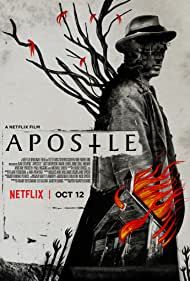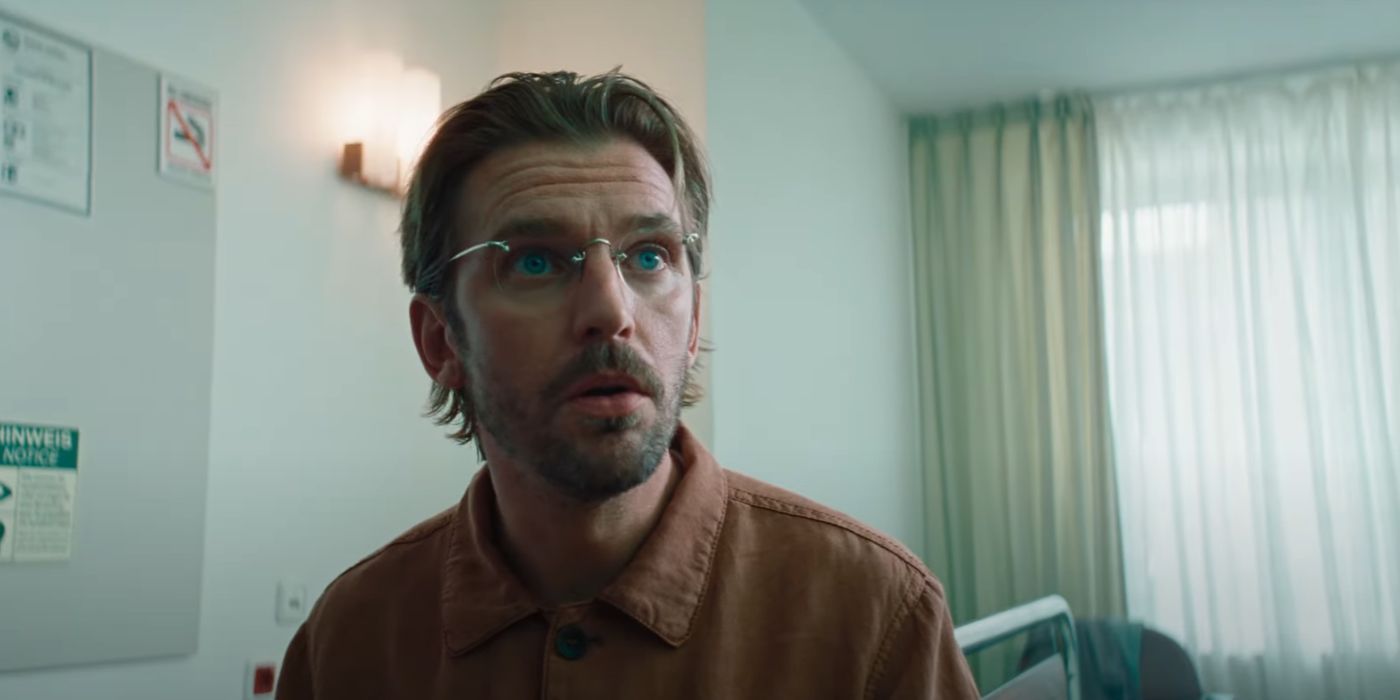This man needs a vacation.
The Big Picture
- Dan Stevens shines in both ‘Apostle’ and ‘Abigail’ with his portrayal of morally gray characters, showcasing his versatility as an actor.
- ‘Apostle’ delves into eco-horror themes, criticizing human superiority and the danger of underestimating the power of nature.
- The intense atmosphere of ‘Apostle’ is heightened by the isolated setting and the relationships within the cult, adding emotional weight to the story.
Dan Stevens gave one of the standout performances in Abigail, starring alongside Melissa Barrera and Kathryn Newton. However, it was not the first time he played a morally grey character in horror, previously doing so in Netflix’s cult horror Apostle alongside Michael Sheen and Lucy Boynton. In Apostle, Stevens plays Thomas Richardson, a man who covertly enters a cult in search of his missing sister. Richardson is no doubt the protagonist of the movie, but he doesn’t always feel like the hero due to his cold exterior and withdrawn personality. Despite this, his fierce loyalty shines through and Stevens manages to create a character that is not necessarily likable but is easy to root for. Apostle takes place in total isolation and sees a town worshiping a God that supposedly controls their crop growth and land quality. As the movie reaches its climax, Apostle offers criticisms of human superiority and the danger of underestimating the power of nature, making it not just a cult movie but also an example of the ever-growing eco-horror subgenre.

Apostle
In 1905, a drifter on a dangerous mission to rescue his kidnapped sister tangles with a sinister religious cult on an isolated island.
- Release Date
- October 12, 2018
- Director
- Gareth Evans
- Cast
- Dan Stevens , Kristine Froseth , Lucy Boynton , Michael Sheen , Bill Milner , Mark Lewis Jones
- Runtime
- 130 minutes
- Main Genre
- Horror
- Writers
- Gareth Evans
- Studio
- Netflix
- Tagline
- Your god can’t help you.
What is ‘Apostle’ about?
Apostle begins by introducing us to Thomas Richardson. A letter read to him by a close family friend reveals his sister is being held for ransom by a cult and, due to his father being inconsolable, he must travel to where the cult lives to get his sister back. The journey to the island highlights how isolated the community is, with Richardson and the other new arrivals traveling by boat across treacherous seas to reach their destination. When Richardson picks up a sheep that was nearly thrown overboard, one of his fellow travelers tosses the creature into the sea. This fleeting moment acts as the first outline of the movie’s environmental themes as the man explains that “she” decides who lives or dies, referring to a higher being. Richardson begins to learn of the cult’s beliefs, with the townsfolk following a divine being who makes their land fertile through blood sacrifice. He is given a glass to put forward his offering each night, and it becomes evident that the cult is not half-hearted in its commitment as Richardson observes one of his fellow new arrivals cutting her arm deeply to make the sacrifice.
Yet, Apostle succeeds in how it creates community and although the cult as a whole is intense, the individual members who the movie spends time with give it nuance and show it is not without cracks. The leaders Malcolm (Michael Sheen), Frank (Paul Higgins), and Quinn (Mark Lewis Jones) are overbearing and their presence is large and difficult to ignore; they have a lot of power over the community. This is totally contrasted by their children, Malcolm’s daughter Andrea (Lucy Boynton) is headstrong and driven, often acting as Thomas’ avenue into the cult and also his glint of hope that he will get his sister back. Quinn’s daughter Ffion (Kristine Froseth) and Frank’s son Jeremy (Bill Milner) are involved in a secret relationship, often sneaking off after hours to see each other. The three children as characters represent the loss of control the leaders are experiencing as their crops fail to grow. It indicates that not even those they raised have faith in their beliefs and represent the unraveling of the cult. The younger characters are also important in allowing the audience to feel empathetic for the cult, with these characters much easier to root for. It is their eventual fates that give this movie its brutal reputation, because of how much they feel like unwilling participants.
Dan Stevens Plays a Morally Gray Character in ‘Apostle’ and ‘Abigail’
Richardson serves as the audience surrogate of Apostle as we learn about the cult through his discoveries and things are only revealed to the audience if Richardson sees them. However, he is not the standard hero; in fact, he is much colder and withdrawn. This makes him difficult to read and what he is thinking or feeling is not always easy for the audience to decipher. But what is evidently clear throughout the whole piece is that he loves his sister deeply and is heavily motivated to get her back, despite an implied troubled relationship with his father. This love is also prevalent through the pockets of empathy he finds within the cult. When he finds Jeremy outside out of hours, he threatens him so he doesn’t speak about their encounter, but it is done in a compassionate and paternal way. It is immediately obvious he would never hurt Jeremy, and the two develop a close bond.

Dan Stevens Is the Next Hot Priest in Horror Movie ‘The Ritual’
Stevens currently stars in the horror hit ‘Abigail’.
Richardson shares a lot of traits with Stevens’s character in Abigail, Frank, yet the actor plays them completely differently. Although at times Richardson is inhospitable, it comes across as personal reservation and never feels intentionally blunt or rude. In contrast, Frank is still unwelcoming but in a much more arrogant manner. He is often rude to Joey (Melissa Barrera) and speaks down to her despite her intelligence. There is an unnerving and untrustworthy tension between them that makes Frank difficult to support. Stevens is undoubtedly magnetic in Abigail, and before Frank’s fate at the movie’s climax, he makes him conceited but never truly one to hate. In Apostle, Stevens still plays a character who is self-assured but his portrayal is much more muted and ambiguous; it tonally fits the piece a lot more and showcases his versatility as an actor.
‘Apostle’ Represents the Growth of Eco-Horror
In the reveal of the creature that the cult leaders have based their whole religious system on, Apostle explores themes of humanity’s relationship with nature. The cult’s goddess is revealed to be an elderly woman figure who requires blood sacrifices to keep the crops growing. This figure acts as an embodiment of Mother Nature through her ability to make the world around her grow. However, her entrapment by the cult leaders shows how she is being exploited to benefit the town. Through this, the movie warns of the dangers of trying to control nature, highlighting that it is an unpredictable force that cannot be reasoned with. The goddess appears suffocated and completely lacks the autonomy she needs to thrive and this is reflected in her rapid deterioration and inability to provide on the scale the town requires.
The abuse of power by the leaders is not only present in their treatment of the deity but in every aspect of their town life. This is seen in the secondary plot that focuses on Ffion becoming pregnant with Jeremy’s child, with the two agreeing to flee and get married. However, her father is very vocal about his disapproval of the baby, and how unnatural it is for Ffion to be pregnant out of wedlock. It adds another layer to Apostle’s conversations about the natural and how those in positions of power manipulate it for ulterior motives.
Apostlle‘s isolated setting makes for an intense atmosphere that is brutal and bloody. The minor networks within the town mean even small moments feel significant and add a huge emotional weight to the big moments later on. Dan Stevens is a subdued leading man who contrasts the extremity of the cult, giving Apostle so much scope to explore its themes of power and nature.
Apostle is available to watch on Netflix in the U.S.
This article was originally published on collider.com


